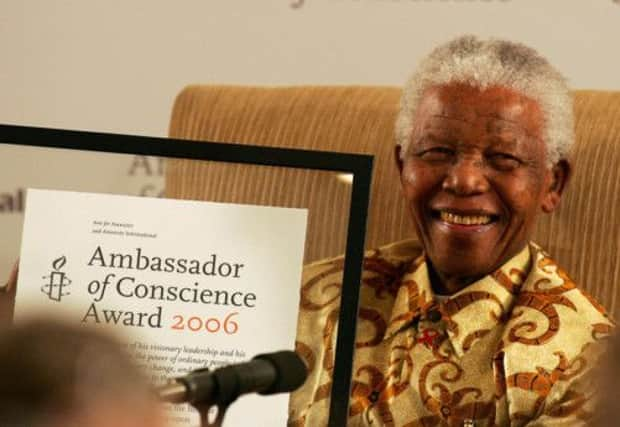Richard Hamer: Human rights tribute to Mandela


The world has lost one of our most visionary leaders – a man who dedicated his life to the fight to protect and promote human rights; not just in his own troubled country, but in every country. Nelson Mandela’s death is a terrible loss for South Africa, but it is also a loss for people all over the world who are fighting for freedom, for justice and for an end to discrimination.
As a global leader who refused to accept injustice, Mandela’s courage helped to change our entire world. His commitment to human rights was epitomised by his unswerving resolve to stamp out racial inequality during apartheid, followed by his vital work in combating HIV/Aids in South Africa. His legacy across Africa, and the world, will stand for generations.
Advertisement
Hide AdAdvertisement
Hide AdHis life of political struggle and self-sacrifice stands as an example to millions around the globe. His grace under pressure, his courage and integrity, and his commitment to healing and forgiveness over revenge and hatred was remarkable.
Louis Blom-Cooper, who was involved in the foundation of Amnesty International in the early 1960s, described his experience of Mandela: “One was struck by this man as being somebody quite outstanding.”
Blom-Cooper was an observer at the long-running trial of Mandela and other anti-apartheid leaders on treason charges prior to their acquittal in March 1961. The memory was an enduring one: “Literally, to face him and hear him speak, one felt one was in the presence of a very substantial individual who one day would become a very prominent citizen of South Africa.
“He had a very appealing face and when he spoke to you, you felt the most important person at that moment was yourself and not him.”
Convicted for treason in 1964 and sentenced to life imprisonment, Nelson Mandela spent 27 years in jail. The desolate Robben Island was prisoner 46664’s home for the last 18 years of his sentence.
Returning to that cell at the turn of this century Mandela showed his inspirational strength of character by lighting a candle for peace.
It is, even now, almost unbelievable to consider that Mandela’s impulse upon emerging from almost three decades of incarceration was to call for peace and reconciliation. He chose to do so by standing alongside millions of others who share his passion for human dignity.
Instrumental in facilitating a seismic political shift in South Africa; he negotiated a peaceful end to white rule with the country’s first multi-racial elections, and led the African National Congress to a resounding electoral victory in 1994. That election was the first fully democratic vote in the country’s history. Although he served only one term as president, his legacy lived on.
Advertisement
Hide AdAdvertisement
Hide AdIn the years following his presidency, Mandela’s outspoken and determined advocacy on behalf of the millions of people living with HIV, particularly in sub-Saharan Africa including South Africa, showed his passion for upholding human dignity, the right to equality and access to justice had not dimmed with time.
His insistence that these were human rights issues helped to ensure that the circumstances of people living with HIV remained an urgent global concern.
In November 2006, my colleagues at Amnesty International declared Nelson Mandela an Ambassador of Conscience in recognition of his work over many years speaking out against human rights abuses in South Africa and around the world.
Accepting the award at the time, Mandela said: “Like Amnesty International, I have been struggling for justice and human rights for long years. I have retired from public life now. But as long as injustice and inequality persist in our world, none of us can truly rest. We must become stronger still.
“Through the work of the Nelson Mandela Foundation, the Nelson Mandela Children’s Fund, and The Mandela Rhodes Foundation, I am continuing my struggle for human rights.”
On the night of the award presentation, we gave Mandela and the Nelson Mandela Foundation five volumes of public reports and campaigns issued by Amnesty International between the 1960s and 1994 on human rights abuses in South Africa.
In accepting the Ambassador of Conscience Award, Mandela graciously acknowledged Amnesty International’s contribution in the fight for human rights.
Nelson Mandela was a victim of great injustice, tried and sentenced under a system of apartheid founded on racism, and denied a fair trial.
Advertisement
Hide AdAdvertisement
Hide AdIn 1978, we published a report on political imprisonment in South Africa: “While apartheid remains, there can be no structure which conforms with and guarantees recognised standards of human rights.” It was only upon Mandela’s release in 1990 that standards of human rights began to be considered in South Africa.
Nelson Mandela was a political prisoner who was also detained for his conscience. He was a man who understood how exclusion of groups destroys the social fabric of a country by creating a politics of inequality. The human rights movement around the world owes him a huge debt of gratitude. All of us who admired him must carry on his struggle as a tribute to his memory.
• Richard Hamer is programme director of Amnesty International – Scotland